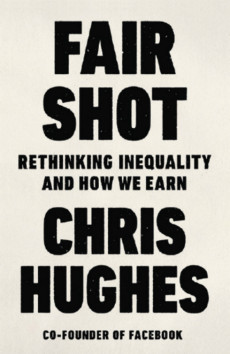Chris Hughes is a very wealthy man. But the cofounder of Facebook didn’t start out that way. His parents are first generation college graduates from small-town North Carolina, one generation removed from the hardscrabble working class of the Great Depression. As he tells it in his new memoir-cum-manifesto, Fair Shot: Rethinking Inequality and How We Earn, Hughes studied hard and won a scholarship to Phillips Academy Andover, a prestigious New England boarding school, followed by admittance to Harvard. There, he met Mark Zuckerberg and Dustin Moskovitz; the three started a little online college experiment that later became a multi-billion-dollar company.
At this point, you might expect a writer, having salted a little humblebrag into the story about his modest origins, to continue extolling the virtues that brought him to the pinnacle of success. Not Hughes. For a man who became fabulously rich in his 20s and is now still in his early 30s, Hughes is remarkably detached from, and objective about, the circumstances that brought him fame and fortune. His candidly stated belief is that he was, if anything, more lucky than good.
Hughes’ acute awareness of his good fortune despite humble origins has led him to contemplate how best to insulate ordinary Americans from the vagaries of economic ups and downs. After a series of less-than-satisfactory experiences with development projects in Africa, Hughes concluded that the most effective way to fight poverty is simply to hand people money, so that they can spend it as they see fit.
The idea of universal basic income has a rich pedigree. As Hughes reminds us, luminaries of both the left (Juliet Rhys-Williams, a British liberal of the 1940s) and right (Milton Friedman, Nobel laureate economist of the conservative Chicago school) have at various points supported the notion. The Earned Income Tax Credit, one of the few remaining bipartisan items of tax policy, arose from the ashes of a guaranteed income program contemplated in the time of President Richard Nixon.
Long out of fashion, the concept of basic income has seen a resurgence amid fears of widespread joblessness in the wake of everincreasing automation. Futurist Martin Ford suggested a basic income in his dystopian Rise of the Robots; Switzerland mooted a guaranteed basic income of about $2,500 per month in a 2016 referendum.
Hughes is also concerned about the effects of globalization, automation, and artificial intelligence. Although these trends have benefited the average consumer, they have (thus far) done little to address long-term problems of runaway health-care, housing, and education costs. As Hughes pithily puts it: “You might be able to buy a less expensive television made in a Chinese factory, but you can’t save money by sending your kid to a preschool in Beijing.” He shouldn’t be so sure: The latest wave of technological innovation might enable your child to attend remotely.
But Hughes has come neither to bury nor to praise technology itself; his larger goal is to address American inequality. Hughes is skeptical of a universal basic income of the kind proposed in Switzerland—at least in the current environment. He (correctly) believes that any right-wing enthusiasm for the idea today is intended to pave the way for a corresponding dismantlement of benefits programs. He likewise recognizes that, with current programs intact, universal basic income would be functionally impossible.
Hughes instead suggests that we pay $500 per month to every adult living in a household earning less than $50,000. That would mean higher taxes on America’s wealthiest families. Hughes is hardly the first to observe that marginal rates for top earners are at levels that the one-percenters of the 1940s-1970s would have been embarrassed to propose for themselves. One of the great appeals of the classic basic income argument, however, is that it is supposed to be universal. Whether a more limited, means-tested plan like Hughes’ could win the support of liberals and conservatives alike is doubtful.
Let’s recognize Hughes’ plan for what it is: a blueprint for large-scale redistribution of American wealth. Readers hoping to find in-depth academic analysis of the causes of inequality or an exhaustive recitation of studies of basic income will be disappointed. This is not that kind of book. Then again, those readers are presumably not Hughes’ target audience.
Whether modified basic income is the answer to America’s crisis of inequality and immobility, well-documented by the likes of economists Raj Chetty, Thomas Piketty, and Emmanuel Saez, remains to be seen. But after the shock to the political system delivered by anxious Trump voters, and in light of the prospect of further disruption from automation, Fair Shot is among the first mainstream, accessible forays into a debate about the outside-the-box options that our society might need to contemplate. To this end, Hughes has given us a thoughtful case for radical reform, wrapped in an appealing and readable autobiography.


